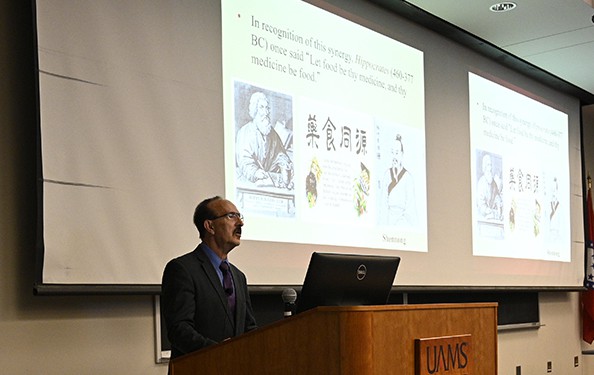Florida State Professor Says Food Can Help Manage Chronic Diseases
| The connection between food and health dates back at least to the time of the Greek physician Hippocrates, said Bahram H. Arjmandi, Ph.D., who recently spoke at UAMS on the role functional foods can play in managing chronic diseases.
“Hippocrates said, ‘Let food be thy medicine and let medicine by thy food,’” said Arimandi, professor and founding director for the Center for Advancing Exercise and Nutrition Research on Aging at Florida State University in Tallahassee, Florida.
“This belief dates back to 440 B.C. but today, we wonder why we don’t take nutrition so seriously anymore.”
Functional foods are foods that have a positive effect on health beyond basic nutrition, such as prunes and blueberries that have antioxidants that protect the body from free radicals that damage cells.
Reza Hakkak, Ph.D., professor and chair of the Department of Dietetics and Nutrition and associate dean for research in the College of Health Professions, introduced Arjmandi. The college’s Department of Dietetics and Nutrition presented the hour-long seminar, which was also available through an interactive video, in celebration of National Nutrition Month.
Arjmandi said that following the arrival of antibodies, society removed the responsibility for our health from ourselves and instead placed it on medicine. In his work, he studies the role of functional foods, bioactive compounds and nutraceuticals in the prevention and treatment of chronic diseases and conditions, such as cardiovascular health, osteoporosis and osteoarthritis in vivo and in clinical trials.
Arjmandi received his doctorate in Human Nutrition from Kansas State University and completed a postdoctoral fellowship with the Department of Cellular & Integrative Physiology at the University of Texas Health Sciences Center.
“We have forgotten that we are responsible for our own health,” said Arjmandi. “But today we realize there’s a place for functional or medicinal food. Educating our physicians is very important.”
Arjmandi spoke of several foods and their benefits. Cranberries are known to reduce urinary tract infections while oregano, sage and rosemary are moderately active as bacterial inhibitors and green tea and its polyphenols have been shown to have numerous health benefits.
Flaxseed can reduce the formation of plaque in hamsters while the pectin in slightly under ripe apples can also be beneficial to cardiovascular health, he said.
Arjmandi said the daily consumption of one large egg may reduce the risk of diabetes and blueberries lower blood pressure.
“I don’t believe there are any negative effects from soy,” he said. “And prunes not only prevent bone loss but also can help reverse bone loss. I eat five to 10 prunes with my cereal every day for their health benefits.”
Arjmandi added that, in moderation, animal protein can be a good form of nutrition.
“I’m not opposed to red meat, milk and sugar,” he said. “Actually, most fruits have a lot of sugar in them. I don’t believe sugar is evil,” he added. “Moderation is the key.”
